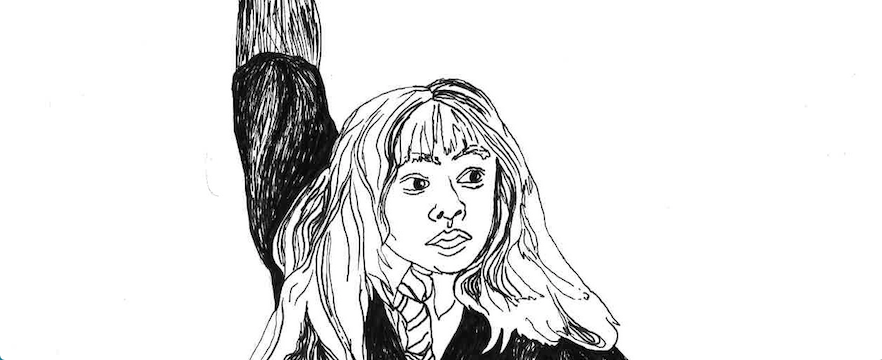Millions of teen girls grew up enchanted by the magical world that J.K. Rowling created in the Harry Potter series. Many young girls such as ourselves were particularly inspired by the main heroine: the quick-witted Hermione Granger. Hermione served as a role model for a generation of female readers. She inspired us with her intelligent and driven character.
Through Hermione, young girls, who often only had access to female characters in books that prioritize beauty and popularity, were freed to envision a world where their intelligence was the most important quality. As strong female students, we found comfort in the narrative of a main character whose nose was always in a book.
Hermione’s friends don’t care that her hair is perpetually messy or that others see her as intimidating. They value her ability to overcome daunting challenges with her wit and bravery. Watching Hermione grow from an uptight, nervous first year to a strikingly powerful young woman inspires girls to push themselves to follow the same path.
Inspired by Hermione, we wanted to pursue excellence. She encouraged us to raise our hands high in the classroom, get straight A’s and become student body president. However, Hermione Granger isn’t a perfect role model.
Throughout the Harry Potter series, Hermione is presented as the only smart girl in the book. Her female friends, such as Ginny Weasley and Luna Lovegood, have other positive traits, but Rowling never portrays them with the same level of intelligence as Hermione.
Not only is she the only “smart girl,” but Hermione goes out of her way to belittle other female characters, such as Cho Chang and Lavender Brown, whose main character traits are beauty and femininity rather than intelligence.
Of course, Hermione gets older and begins to see herself in the world in a more complex way and to appreciate others for who they are.
However, looking up to Hermione, we too focused only on our intelligence. We went through her same struggle as we entered high school and figured out that we cared about many aspects of our lives.
Hermione basing self-worth off one attribute, even if it is intelligence, is never a positive viewpoint to encourage.
49% of US teens ages 15-17 have read the Harry Potter books, according to Statista. The millions of female readers who identify with and look up to Hermione are encouraged to be the smartest girl in their classroom. Of course, academic excellence is a positive habit to encourage in girls. However, the academic success that Hermione often seeks at the cost of others, such as suggesting an exam when other students are unprepared, encourages competition instead of collaboration among teen girls.
At Lick-Wilmerding High School, a school with an acceptance rate of under 20%, most girls, like us, were the Hermione Granger of their middle school. A grade full of smart and driven girls should encourage teamwork among alike peers, but in our experience, the Hermione Granger mindset instead bred rivalry. The intelligence of other girls became a threat to our own identities. An environment where other girls excelled felt frightening to our own sense of self.
Hermione also demonstrates a lack of balance to young readers. Although she is an incredibly diligent student, she seems to care more about her grades than anything else, especially when she is young. Harry, Ron and Ginny plays Quidditch, Luna passes out the Quibbler, and even Neville Longbottom develops a passion for Herbology. Throughout most of the series, however, Hermione’s main focus remains on her studies.
Hermione often takes on more work than she can handle, resulting in unhealthy study habits. In the third book, Hermione is given a special time-turner in order to sign up for more classes. With literally not enough time in her schedule for her massive course load, Hermione spreads herself too thin and ends up dropping out of one of her classes. As a 13-year-old student, Hermione should not be stressed about the amount of work that she has to do, yet she is found by Harry and Ron, asleep over her books in the common room.
Reading about Hermione’s late nights in the library was inspiring to girls like us. Growing up, we couldn’t wait to pull all- nighters before tests or take classes that others thought were too difficult. We picked up on unhealthy study habits at a young age by romanticizing Hermione’s struggles with school work and we ourselves began to struggle with the same issues.
When young girls look up to Hermione, they see a young woman who only finds self-worth in her intelligence. Growing up, young female readers are inspired to put school before everything, striving for perfection in academics without paying attention to other qualities that are needed to develop balance.
By portraying Hermione as one- dimensional, Rowling prevents girls from seeing themselves as well rounded people.
There are wonderfully positive aspects to identifying with a character like Hermione, such as the continued development of work ethic, intelligence, and courage. However, boys are regularly shown role models with these traits and more, such as the balance of loyalty and humor in Ron and leadership and kindness in Harry. When girls are looking for role models, they can often and a Hermione who is smart or a Ginny who is athletic, but young female readers struggle to and characters that are multidimensional. This limits girls’ perceptions of who they can and should be.
Young girls should not have to choose between identities but rather be encouraged to explore and integrate all of them. We hope that a generation of Hermione’s chooses to write books full of characters more well-rounded than Hermione ever got the chance to be.







